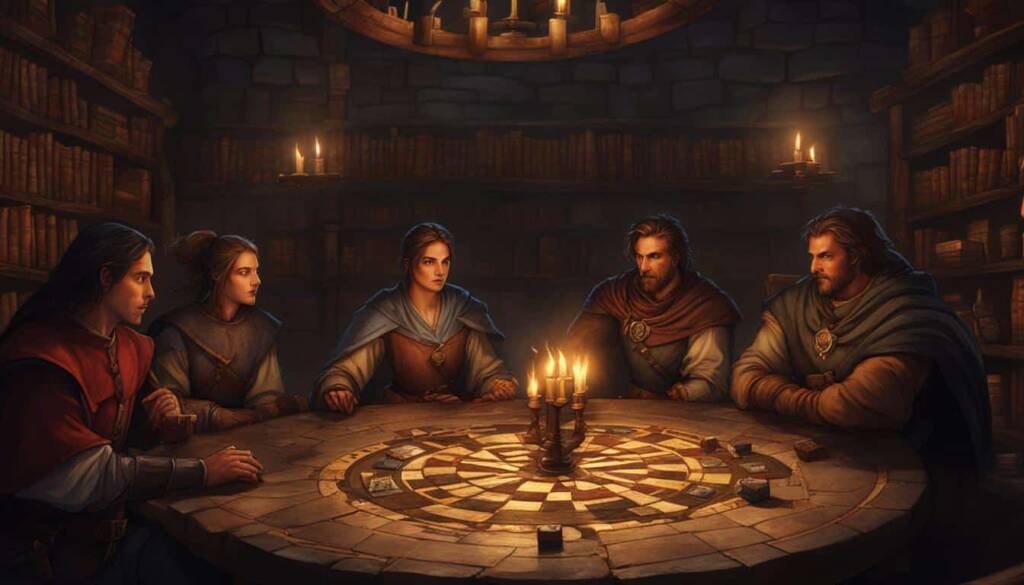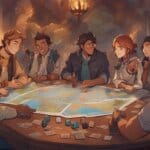Table of Contents
A role-playing game (RPG) is a gaming genre that combines storytelling with character progression in immersive fantasy and adventure worlds. RPGs allow players to assume the role of a character and interact within the game’s imaginary world. Many RPGs are set in fantasy or science fiction environments and are played online or digitally.
RPGs often have a storyline and central quest that players aim to complete, adopting the role of a fictional character. These games involve elements such as levels, statistics, combat systems, equipment, character classes, and player interaction. The game master, either a human or computer, serves as the narrator and rule keeper.
Popular RPGs include Dungeons and Dragons (D&D), EverQuest, Final Fantasy, and Dragon Age. RPGs have a rich history, originating with D&D in 1974 and evolving with the development of technology and computing innovations. Modern RPGs are heavily narrative-driven, with complex gameplay mechanics and stunning graphics, and can be played on various platforms such as PCs, consoles, and mobile devices.
The Origins and Types of RPGs
Role-playing games (RPGs) come in various forms, catering to different preferences and styles of gameplay. From traditional tabletop games to immersive video game experiences, RPGs offer diverse opportunities for players to immerse themselves in fictional worlds and engage in interactive storytelling.
Tabletop Role-Playing Games (TRPGs)
The tabletop role-playing game, or TRPG, is the original format of RPGs. In a TRPG, players gather together in a small social setting, often around a table, to play the game. The most well-known TRPG is Dungeons and Dragons (D&D), which has captivated players since its inception in the 1970s.
During a TRPG session, players create their own characters and work together with a game master (GM) to navigate the game’s storyline. Players describe their character’s actions and decisions, while the GM narrates the outcomes and guides the overall adventure. TRPGs require imagination, creativity, and collaboration, making them a social and engaging gaming experience.
Live Action Role-Playing (LARP)
For those who seek a more physically immersive experience, live action role-playing (LARP) offers an exciting alternative. In LARP, participants physically act out their characters’ actions and engage in real-world interactions within a fictional setting. These events often feature elaborate costumes, props, and immersive environments.
In a LARP, players embody their characters, engaging in both combat and non-combat scenarios. Whether it’s exploring ancient ruins or engaging in political intrigue, LARP provides a unique blend of improvisation, storytelling, and physicality.
Computer Role-Playing Games (CRPGs)
The advent of computer technology brought RPGs to the digital realm. Computer role-playing games (CRPGs) offer players a visually enhanced and interactive experience. Influenced by their tabletop counterparts, CRPGs focus on character development, exploration, and combat.
In CRPGs, players navigate virtual worlds, engaging in quests, advancing storylines, and making choices that impact the game’s narrative. These games often feature detailed graphics, complex character progression systems, and vast open worlds to explore.
Massively Multiplayer Online Role-Playing Games (MMORPGs)
MMORPGs take the digital RPG experience a step further by offering a massive, shared virtual world for players to explore and interact with others. These online games enable thousands of players to connect and play simultaneously, forming communities, participating in quests, and battling formidable enemies.
MMORPGs combine the social aspect of gaming with large-scale gameplay, allowing players to embark on epic adventures, team up with friends, and engage in player-versus-player combat. These games often feature persistent worlds that continue to evolve and grow, providing endless opportunities for exploration and progression.
Storytelling Games
Beyond traditional RPGs, there are also storytelling games that place a greater emphasis on plot and character interaction.
These games prioritize the art of storytelling, encouraging players to collaboratively craft narratives, develop intricate characters, and explore complex themes. While they may have simplified game mechanics compared to other RPGs, storytelling games offer a unique and immersive narrative experience.
Overall, RPGs have evolved and embraced various formats, ranging from intimate tabletop gatherings to vast online communities. The origins and types of RPGs cater to different playstyles and preferences, providing diverse avenues for players to embark on memorable adventures and shape interactive narratives.
The Impact and Benefits of RPGs
RPGs have a significant impact on interactive storytelling. Unlike traditional forms of fiction, RPGs allow players to actively participate in the story and make choices that affect the outcome. This interactivity enhances the entertainment value and immersion of the gaming experience.
RPGs have also been utilized in therapeutic settings to help individuals develop behavioral, social, and language skills. They have proven to be beneficial for young people with learning difficulties such as Autism spectrum disorders, ADHD, and dyslexia. RPGs provide a safe space for individuals to practice and improve these skills, as well as to express themselves creatively.
Additionally, RPGs have educational applications, serving as tools for teaching, training, and academic research. They can be used to simulate real-world processes and scenarios, allowing for experiential learning. The impact and benefits of RPGs extend beyond entertainment, making them a valuable form of interactive storytelling and a versatile educational tool.
FAQ
What is a role-playing game (RPG)?
A role-playing game (RPG) is a gaming genre that combines storytelling with character progression in immersive fantasy and adventure worlds. RPGs allow players to assume the role of a character and interact within the game’s imaginary world.
Where are RPGs typically set?
Many RPGs are set in fantasy or science fiction environments and are played online or digitally. They often have a storyline and central quest that players aim to complete, adopting the role of a fictional character. RPGs also include elements such as levels, statistics, combat systems, equipment, character classes, and player interaction.
How are RPGs played?
RPGs can be played online, on consoles, or on mobile devices. The game master, either a human or computer, serves as the narrator and rule keeper. Players interact with the game world, complete quests, and develop their characters using various gameplay mechanics.
What are some popular RPGs?
Popular RPGs include Dungeons and Dragons (D&D), EverQuest, Final Fantasy, and Dragon Age. These games have a rich history, originating with D&D in 1974 and evolving with the development of technology and computing innovations.
What are the different types of RPGs?
RPGs come in various forms. The tabletop role-playing game (TRPG or TTRPG) is the original format, played through discussion in a small social gathering. Live action role-playing (LARP) involves participants physically acting out their characters’ actions. Electronic media offers computer role-playing games (CRPGs) and massively multiplayer online role-playing games (MMORPGs) that can be played on different platforms. There are also storytelling games that emphasize plot and character interaction over game mechanics and combat.
What is the impact of RPGs on interactive storytelling?
RPGs allow players to actively participate in the story and make choices that affect the outcome. This interactivity enhances the entertainment value and immersion of the gaming experience.
Do RPGs have any therapeutic benefits?
Yes, RPGs have been utilized in therapeutic settings to help individuals develop behavioral, social, and language skills. They have proven to be beneficial for young people with learning difficulties such as Autism spectrum disorders, ADHD, and dyslexia.
How can RPGs be used for education and training?
RPGs have educational applications and can serve as tools for teaching, training, and academic research. They can be used to simulate real-world processes and scenarios, allowing for experiential learning.













